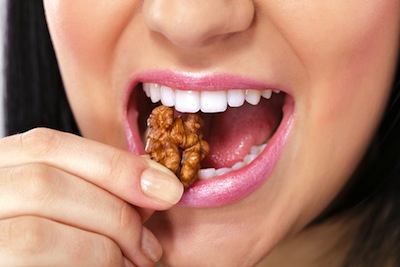
by Dr. Jacqueline S. Allen | Jun 9, 2015 | Blog, Endodontics, Root Canal
 While today’s root canals have an extremely high success rate and have very low levels of discomfort, there are things you can do to lessen the likelihood that you will ever need to be treated by an endodontist and have a root canal. Dr. Allen, an endodontist at Phoenix Endondontic Group, recently shared three tips that can help keep your teeth healthy and avoid the need for a root canal.
While today’s root canals have an extremely high success rate and have very low levels of discomfort, there are things you can do to lessen the likelihood that you will ever need to be treated by an endodontist and have a root canal. Dr. Allen, an endodontist at Phoenix Endondontic Group, recently shared three tips that can help keep your teeth healthy and avoid the need for a root canal.
How to prevent a root canal
- Brush and floss daily. Your oral health regimen is your best line of defense against tooth decay, which can fuel infection inside your tooth and cause a root canal treatment to be needed.
- Visit your dentist regularly. Dr. Allen noted that a significant advantage of visiting a general dentist for a checkup is the comprehensive examination that is conducted. The images taken of your teeth via X-ray or radiograph can show hidden infection or damage to your teeth, and the prophylactic cleaning helps reduce plaque, which reduces the chance of a tooth becoming infected.
- Protect your teeth from dental injuries. One common route to the need for a root canal is for a tooth to become cracked or chipped, then infected. Wear a mouth guard if you play contact sports, use a night mouth guard while sleeping if you experience bruxism (teeth grinding), and use care when eating hard or crunchy foods.
Dr. Allen concluded, “Because root canal therapy can be necessary for a host of reasons, there sometimes is no way to prevent one. However, regular checkups and radiographs at your general dentist’s office can catch some of those reasons, like decay or cracks, before they become an issue.”

by Dr. Jacqueline S. Allen | Jun 2, 2015 | Apicoectomy, Blog, Endodontics
 Although modern dentistry offers amazing artificial tooth restoration options, nothing is as good as a functional natural tooth. Your endodontist may recommend you have a surgical procedure known as an apicoectomy to save your natural tooth if you’ve had a root canal treatment that hasn’t been entirely successful.
Although modern dentistry offers amazing artificial tooth restoration options, nothing is as good as a functional natural tooth. Your endodontist may recommend you have a surgical procedure known as an apicoectomy to save your natural tooth if you’ve had a root canal treatment that hasn’t been entirely successful.
Since an apicoectomy differs from a standard root canal treatment, it helps to know what to expect. Here are a few quick facts about the surgery and its impact on your oral health.
Having an Apicoectomy: What You Need To Know
- What it is: An apicoectomy is surgery on the end of your tooth root (also known as the apex). The infected tooth root is removed and a small filling placed to prevent further problems. Dr. Allen of the Phoenix Endodontic Group explains that during an apicoectomy, “Your endodontist will make an incision on your gum tissue to move it out of the way temporarily. Then they will perform microsurgery on the end of the roots and put the gum tissue back into place.”
- Why it is needed: You may need an apicoectomy because the tooth that received a root canal treatment has complex roots. The surgery may also need to be performed because the tooth in question has a crown or a bridge and retreatment of the root would require the cutting through the restoration.
- Preparation for the procedure: Before your apicoectomy, your endodontist will take X-rays of the tooth and surrounding bone. You may be given an antimicrobial mouth rinse, a medicine to reduce inflammation, and/or antibiotics to get your mouth in the best possible condition for the surgery.
- Post-apicoectomy recovery: For the first 12 hours, you’ll want to apply ice packs to the side of the face near the affected area – 20 minutes on, 20 minutes off. Avoid eating crunchy or hard foods for the first few days. Dr. Allen advises, “There is minimal discomfort after apical surgery, but there can be some swelling. That can be minimized with ice packs.” You should recover from the procedure within two weeks. Eventually, the bone heals around the end of the root.
Dr. Allen concludes, “Apicoectomies give patients with tooth root infections another chance to save their tooth. It is the most biologic and cost-effective option for maintaining your oral health.”

by Dr. Jacqueline S. Allen | May 25, 2015 | Blog, Endodontics, Stress, TMJ
 The economic upheavals of the past 10 years have been difficult for many of us. One surprising aspect of this situation is the mounting evidence that financial challenges (as well as other types of intense stressors) can also impact your oral health.
The economic upheavals of the past 10 years have been difficult for many of us. One surprising aspect of this situation is the mounting evidence that financial challenges (as well as other types of intense stressors) can also impact your oral health.
Stress affects the entire body, making no exceptions for your mouth. Dr. Jacqueline Allen of the Phoenix Endodontic Group explains that there are several oral health conditions that can be caused or exacerbated by periods of high stress.
Bruxism, or teeth grinding, happens when a patient habitually clenches his or her jaw or grinds their teeth together. Often, this happens when a patient is sleeping. Common symptoms of bruxism include a tender jaw muscle, headaches, earaches, and the tips of the teeth appearing flat. Your dentist will be able to tell by looking at the condition of your teeth if you are grinding them.
Stress is a major cause of bruxism. Dr. Allen notes that if bruxism is left untreated, your teeth can become cracked and an infection may occur, which could result in the need for a root canal or other endodontic treatment. If you have this condition, your dentist may recommend the use of a custom-made night mouth guard, which is often effective in preventing additional damage to your teeth.
Another stress-influenced oral health condition is Temporomandibular Joint Disorder, or TMJ, an overuse injury that is related to a frequently clenched jaw. As with bruxism, you may have a headache or earache, or you may experience popping or clicking in your jaw. Treatments include wearing a night mouth guard, practicing relaxation techniques, taking anti-anxiety medications, or having surgery on your jaw joint if the condition is serious enough.
Dr. Allen says that periodontal (gum) disease also has a stress-related component. Elevated levels of the stress hormone cortisol may be involved, and those under extreme stress often neglect good oral health habits. Symptoms can include swollen or bleeding gums, bad breath and loosening teeth. Treatments include scaling and root planing the teeth and gum surgery.
For all three of these oral health challenges, one key to successful treatment is to lower your overall stress levels. Eat a healthy diet, make time for exercise, and explore counseling, relaxation techniques or lifestyle changes to reduce or eliminate troublesome stressors.
Dr. Allen says, “Keeping your stress at optimal levels is key to reducing its impact on your oral health.”

by Dr. Jacqueline S. Allen | May 18, 2015 | Blog, Endodontics, Root Canal
 A root canal is a dental procedure done in order to save a tooth that has become decayed or infected. While some discomfort is possible after a root canal, newer materials, better magnification and advanced tools and techniques have led to better treatment outcomes and less discomfort. Dr. Allen of the Phoenix Endodontic Group recently shared some tips designed to make your post-treatment recovery period as pleasant as possible.
A root canal is a dental procedure done in order to save a tooth that has become decayed or infected. While some discomfort is possible after a root canal, newer materials, better magnification and advanced tools and techniques have led to better treatment outcomes and less discomfort. Dr. Allen of the Phoenix Endodontic Group recently shared some tips designed to make your post-treatment recovery period as pleasant as possible.
- Know what to expect: Often, on the first day after a root canal procedure, you may experience some minor gum discomfort stemming from the rubber dam used to isolate the tooth undergoing the procedure. Also, the tooth being treated may itself be a little sensitive. In both cases, this discomfort can usually be easily controlled with an over-the-counter analgesic.
- Post-treatment considerations: It can be useful (not to mention reassuring) to understand how the healing process typically unfolds after a root canal A study conducted in 2008 noted that only about 8 percent of patients experienced a “flare-up” after their root canal, which was defined as development of discomfort or swelling after a scheduled root canal appointment that necessitated an unscheduled dental visit for attention.
- Know how to care for your teeth post-treatment: Eat gently and avoid crunchy foods until your tooth is completely rebuilt (more on that in a moment). Continue to brush and floss, but not so vigorously that the root canal’s temporary filling is compromised.
- Communicate with your endodontist: Contact your endodontist right away if you develop any of the following symptoms: a visible swelling inside or outside of your mouth; an allergic reaction to medication that involves a rash, hives or itching; a return of the original symptoms in the tooth; or if your bite feels uneven.
A root canal is just the first step in saving your tooth. Discuss with your endodontist which final restoration option will be used, and make sure you’re clear about the timeline for returning to finish your treatment.
Dr. Allen says, “Your endodontist is your partner in minimizing your discomfort after your root canal, and in ensuring your treatment is ultimately successful.”

by Dr. Jacqueline S. Allen | Apr 22, 2015 | Blog, Cracked Teeth, Endodontics, Phoenix Endodontic Group
 Cracked teeth are a common malady in the endodontic world. Dr. Allen of Phoenix Endodontic Group treats this problem frequently and notes some common causes, often food-related. Here’s what you should know about foods that commonly cause tooth breakage and what to do if you experience the issue.
Cracked teeth are a common malady in the endodontic world. Dr. Allen of Phoenix Endodontic Group treats this problem frequently and notes some common causes, often food-related. Here’s what you should know about foods that commonly cause tooth breakage and what to do if you experience the issue.
One of the leading food-related culprits that cause cracked teeth is ice. The impact of the tooth striking the very hard surface of the ice as you chew places excessive stress on the tooth’s enamel. The tooth may crack instantly or over time may incur many microscopic fractures until the tooth eventually breaks apart. The result can be quite painful and require major work to fix.
In addition to ice, other frequent fracture-causing foods are hard candy and smaller nuts, says Dr. Allen. Holidays tend to generate lots of patients with cracked teeth since such treats are more easily accessible. Though candy in any form is not good for your teeth, if you choose to eat hard candy it should be sucked on rather than chewed to prevent dental fractures. Be cautious when eating hard nuts and don’t nibble them with your front teeth.
Cracked teeth can also result from random eating incidents. One patient cracked a tooth on a pebble in her salad, and in another unusual circumstance , A patient was chewing the marrow out of a bone and accidentally bit the bone, Dr. Allen describes. These types of occurrences may not be avoidable, unfortunately. Even if you do not notice any visible damage from accidentally biting something very hard, it’s best to have your tooth checked out after the incident.
Should you experience cracked teeth from eating or from any other incident, talk to your endodontist right away. Generally the milder the damage, the less extensive the work needed to repair it. If the damage is ignored the chances of the tooth being eventually lost will increase exponentially.
Dr. Allen and her colleagues at Phoenix Endodontic Group are experts at handling cracked teeth and more, giving you the best odds of keeping your natural teeth. Don’t hesitate to reach out right away for best results!

by Dr. Jacqueline S. Allen | Mar 30, 2015 | Blog, Dentistry, Endodontics, Sports
 As the spring training crowds populate the valley and amateur spring sports are beginning, Dr. Allen of Phoenix Endodontic Group has some wise words to help players avoid dental injuries.
As the spring training crowds populate the valley and amateur spring sports are beginning, Dr. Allen of Phoenix Endodontic Group has some wise words to help players avoid dental injuries.
The speed and velocity of a thrown or hit fastball is certainly impressive, and can be a major danger to your beautiful teeth. Imagine this projectile hurtling towards you at speeds over 100mph. Losing your focus for even a second could potentially result in significant damage to your teeth and mouth. Dr. Allen identifies the most common baseball dental injuries as Avulsed (knocked-out) teeth and fractures of the teeth, which are painful and avoidable.
The best method of preventing dental injuries is very simple. WEAR A MOUTHGUARD. This is basically the only way to protect the teeth during contact sports, Dr. Allen warns. These are found at any store that carries sporting goods and should be considered a mandatory part of your equipment as a baseball player.
Should you suffer a knocked out tooth, a few tips may improve your chances of saving the tooth. First, retrieve the tooth gently, grasping it only by the chewing surface and never the root. Once the tooth has been acquired, rinse it thoroughly with clean water. Do not scrub the tooth or clean it with anything other than a washed finger and clear water. Try to reinsert the tooth back into position if possible and keep it in place with your fingers or closed mouth. If you are not able to reinsert the tooth, store it in milk (or failing that, inside your cheek) and get to your Endodontist immediately. Do not let the tooth dry out or wrap it in napkins or cloth.
Dental injuries like cracked or fractured teeth should also be attended to as soon as possible to help avoid further deterioration of the tooth. Prompt attention generally results in a less complex repair process and better chances of saving the tooth.
Dental injuries are extremely preventable with a little precaution. Talk to Dr. Allen about protecting your teeth during baseball and similar sports. Should you suffer a dental emergency, the fantastic doctors and staff at Phoenix Endodontic Group will save the day!

 While today’s root canals have an extremely high success rate and have very low levels of discomfort, there are things you can do to lessen the likelihood that you will ever need to be treated by an endodontist and have a root canal. Dr. Allen, an endodontist at Phoenix Endondontic Group, recently shared three tips that can help keep your teeth healthy and avoid the need for a root canal.
While today’s root canals have an extremely high success rate and have very low levels of discomfort, there are things you can do to lessen the likelihood that you will ever need to be treated by an endodontist and have a root canal. Dr. Allen, an endodontist at Phoenix Endondontic Group, recently shared three tips that can help keep your teeth healthy and avoid the need for a root canal.









